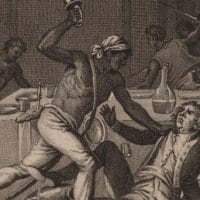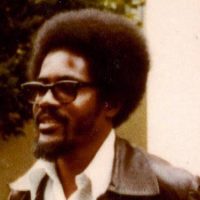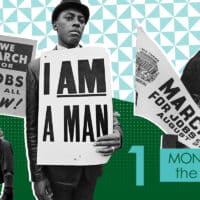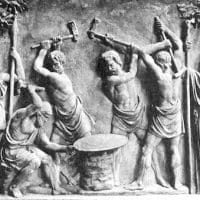-
U.S. marks anniversary of death of Native American Chief Crazy Horse
He was the Sioux Chief of the Oglala tribe and a great warrior in the Sioux resistance to the white man’s invasion of the northern Great Plains, also known as the Great American Desert.
-
Learning from our elders: Kwame Somburu and Scientific Socialism
Longtime revolutionary activist Kwame Somburu made it a point throughout his life to stress the “scientific” in socialist. During a time of confusion regarding what socialism is, Kwame’s insistence has never been more crucial.
-
Modern slavery: the labor history behind the new nationwide prison strike
A labor historian traces the origins of the 2018 prison strike through a legacy of involuntary servitude.
-
Boots Riley’s critique of Spike Lee’s “BlacKkKlansman”
Sorry to Bother You director and musician Boots Riley on Spike Lee’s, BlacKkKlansman: “It’s a made up story in which the false parts of it to try to make a cop the protagonist in the fight against racist oppression. It’s being put out while Black Lives Matter is a discussion—and that is not coincidental. There is a viewpoint behind it.”
-
Samir Amin: September 3, 1931-August 12, 2018
“Increased awareness will not happen through successive adaptations to the requirements of capitalist accumulation, but through awareness of the necessity of breaking with those requirements.” —Samir Amin
-
The New Postcolonial Economics with Fadhel Kaboub
In this episode, we speak with Fadhel Kaboub (@fadhelkaboub), associate professor of economics at Denison University and President of the Global Institute for Sustainable Prosperity. Fadhel outlines a new critical approach to postcolonial political economy, arguing that re-gaining financial sovereignty is a crucial next step for postcolonial nations hoping to achieve social, economic, and environmental justice.
-
There’s now proof that Soeharto orchestrated the 1965 killings
As Indonesia commemorates 20 years since the fall of the New Order military dictatorship, the foundation myth of the regime (and, indeed, the post-New Order state as well) remains stubbornly in place.
-
The Texas counter-revolution of 1836
This is a spot-on history of the birth of the American empire. But beyond recounting the regional and national events celebrated on the monument, re-viewing the Texas revolution in a world-historical perspective offers a far more insightful understanding of the conflict that occurred in northern Mexico in the 19th century.
-
Escraches come north: “Incivility” or an end to impunity?
We need to remember that these protests aren’t about political views: they’re about government officials violating international law, U.S. treaty obligations, and basic human rights.
-
Potency of Walter Rodney’s ideas 38 years after assassination
Thirty-eight years have passed since Walter Rodney was assassinated in Guyana on 13 June 1980 in Georgetown, Guyana’s capital city, but his legacy lives on beyond his home-country.
-
Confronting Cinema’s Fascist Unconscious with Maxximilian Seijo
In this episode, Money on the Left cohost Maxximilian Seijo (@maxseijo) expands upon the argument made in his video essay, “Inglorious Basterds: Nazi Desire Fully Employed,” which takes a neochartalist lens to Quentin Tarantino’s Inglorious Basterds (2008).
-
Requiem for a steelworker: Mon Valley memories of Oil Can Eddie
Four decades ago Ed Sadlowski was the elected leader of 130,000 blue-collar workers, part of a United Steelworkers (USW) membership then totaling 1.4 million, about twice what it is today.
-
Job Guarantee as Historical Struggle with David Stein
In our inaugural episode, we consider the recent resurgence of full employment politics in the United States from both a political and historical perspective with historian David Stein (@davidpstein).
-
History notes: A scrap book of words and actions
A compilation of relevant historical notes reflecting upon the bombing of Syria on April 13, 2018 by the United States, United Kingdom, and France.
-
The stormy petrel
In Moscow there has been something like a revival of interest in the immortal Alexei Maximovich Peshkov, who called himself Gorky, the Bitter One. Even Gorky’s portrait, which had been removed from the title page of the influential literary magazine Literaturnaja Gazeta, is shining there again next to Pushkin’s.
-
Gun controls in old East Germany
Strict weapons’ laws in the old East Germany, undoubtedly a restriction of on freedom, meant that there were virtually no shooting deaths and never a single mass shooting, in schools or anywhere else.
-
Roxanne Dunbar-Ortiz, Loaded & Gregg Levine on Fukushima Daichi radiation
Roxanne Dunbar-Ortiz tells us about her new book, Loaded: A Disarming History of the Second Amendment.
Then we talk with journalist Gregg Levine about his special investigation for The Nation Magazine into the deaths and illnesses afflicting U.S. sailors exposed to radiation from the Fukushima Daichi meltdown. It’s titled “Seven Years on, Sailors Exposed to Fukushima Radiation Seek Their Day in Court.”
-
The poison and the tomb
It takes three days on the open sea to journey from the Marshall Islands capital to Enewetak Atoll. You can’t see the atoll until you’re just miles away as it’s only feet above sea level. As you get closer, the sun fades behind clouds and the islands are shrouded in mist. Beaches are fringed not by coconut palms but Australian pines, trees praised for soaking up salt-spray and airborne radionuclides.
-
Race traitors wanted: apply within
The term “white working class” captured much of the media analysis which sought to explain Trump’s meteoric rise and subsequent victory to the highest office in the United States. The obsession with polling and voting trends based in demographics is certainly nothing new.
-
The gong of history; or, what is a human?
Every great historical epoch in the freedom struggle raises the question: what is a human? The answer changes, to quote Askia Muhammad Toure of the Revolutionary Action Movement, with “the Gong of History.” Amid all the confusing din of history, a note may sound that makes it audible and intelligible.



















